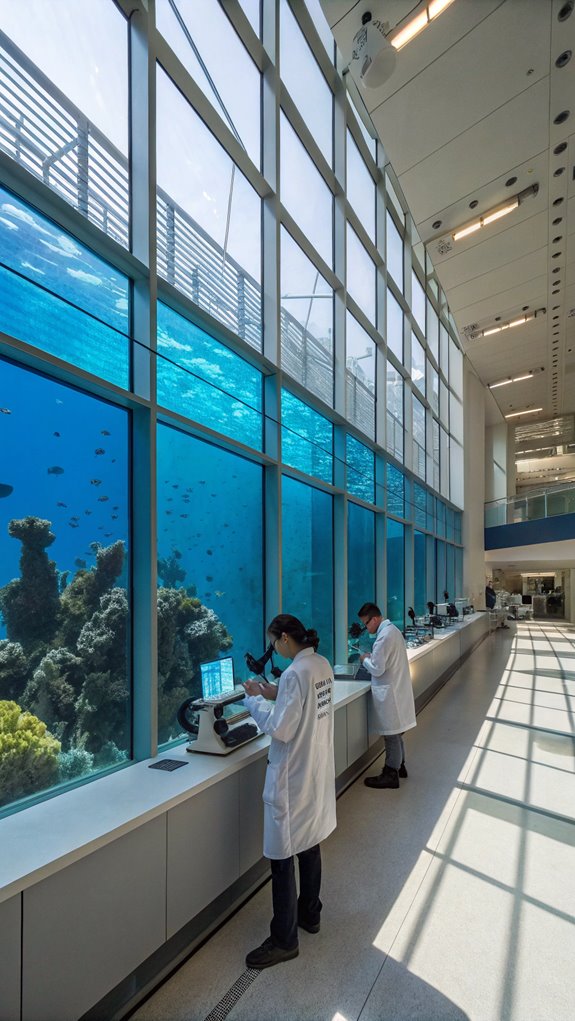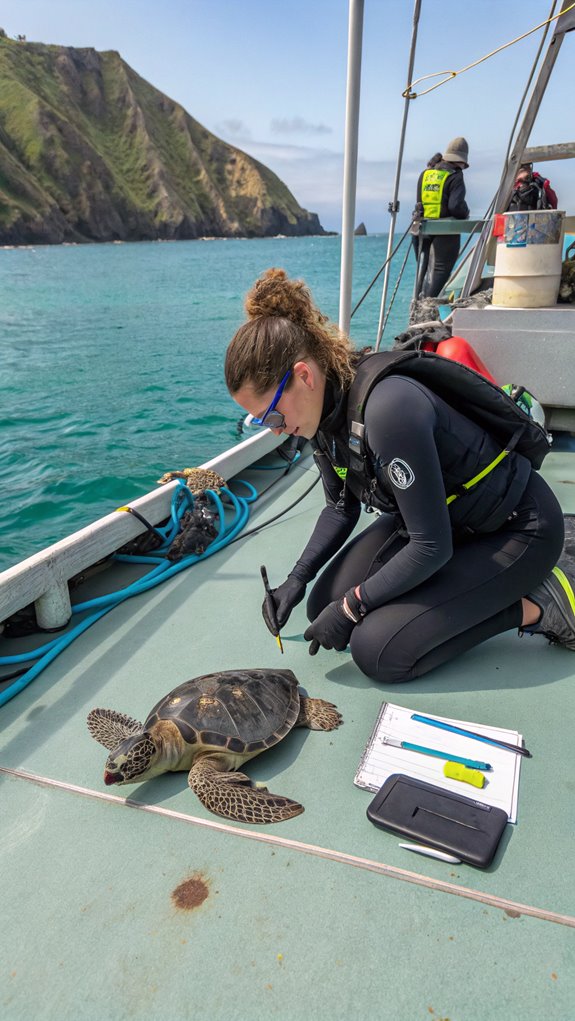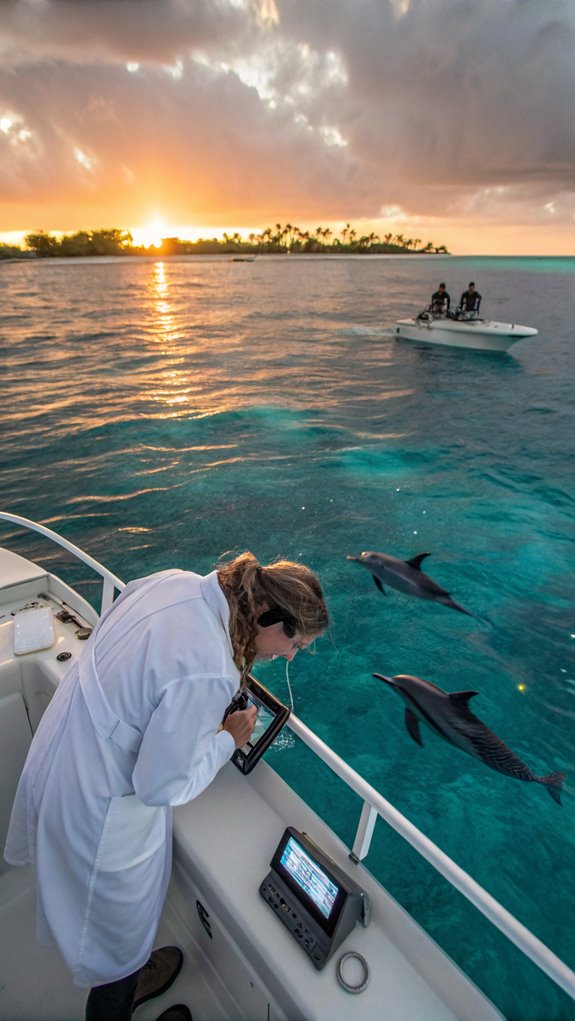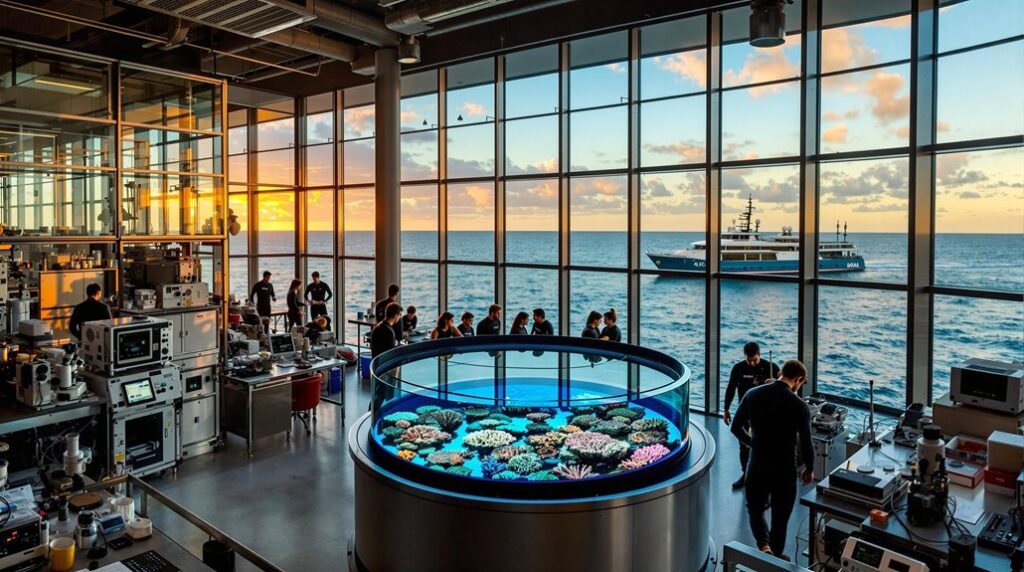You'll find exceptional marine biology programs at institutions like Scripps Institution of Oceanography, University of Miami, and Duke University. These schools offer hands-on learning with direct access to coastal ecosystems, state-of-the-art laboratories, and research vessels. You'll benefit from low student-faculty ratios, personalized mentorship, and internship opportunities that build valuable professional networks. Top programs combine rigorous coursework in biology, chemistry, and marine ecology with practical field experience. With starting salaries around $43,000 and growing industry demand, marine biology offers promising career paths. Let's explore what makes these programs stand out.
What Makes Marine Biology Programs Outstanding

While many universities offer marine biology degrees, truly outstanding programs share several key characteristics that set them apart. When you're evaluating marine biology programs, you'll find that the best ones emphasize hands-on learning through direct access to coastal ecosystems and specialized research laboratories. These programs don't just teach theory; they immerse you in practical experiences that prepare you for real-world challenges.
Top programs distinguish themselves through their broad approach to marine biology expertise. You'll study core subjects like marine ecology and molecular biology while engaging in interdisciplinary approaches that integrate chemistry and environmental science. The curriculum you'll encounter combines rigorous academic coursework with practical applications, guaranteeing you develop a well-rounded understanding of marine systems.
What really makes these programs stand out is their commitment to research opportunities and professional development. You'll benefit from extensive research facilities and partnerships with marine research organizations, which open doors to valuable internships and collaborative projects. The low student-faculty ratio you'll find at leading institutions guarantees you receive personalized mentorship from experienced professors who can guide your academic and career path.
These outstanding programs also prioritize access to state-of-the-art laboratories and research vessels, where you'll gain hands-on experience with current scientific methods and equipment. Through this combination of academic rigor, practical experience, and professional networking, you'll develop the broad marine biology expertise necessary for success in this competitive field.
Top Marine Biology Schools
Building on these hallmarks of excellence, several U.S. universities stand out for their exceptional marine biology programs. The Scripps Institution of Oceanography at UC San Diego leads the pack with its thorough marine biology program and groundbreaking climate change research. You'll find extensive research opportunities here that'll prepare you for a career at the forefront of marine science.
The University of Miami offers you direct access to diverse marine ecosystems, making it an ideal choice if you're passionate about marine conservation. Their specialized programs combine theoretical knowledge with practical experience, giving you the skills needed for real-world challenges in marine biology.
At Duke University, you'll benefit from their well-equipped marine lab that supports various interdisciplinary programs. Their focus on marine biology and conservation provides you with a solid foundation in both research and practical applications. Meanwhile, UC Santa Cruz's Coastal Science Campus features state-of-the-art underwater laboratories, where you can conduct hands-on research in marine environments.
If you're looking for strong industry connections, California State University's marine biology degree programs deliver excellent networking opportunities. You'll find focused internship programs that connect you directly with local marine industry partners, enhancing your career prospects.
Each of these institutions offers unique advantages for your marine biology education. Whether you're drawn to cutting-edge research facilities, diverse ecosystems, or strong industry connections, these top schools provide the resources and expertise you'll need to succeed in marine biology.
Research and Field Experience Opportunities

Through extensive research and field experience opportunities, you'll gain the practical skills vital for a successful marine biology career. Top marine biology programs across the United States offer diverse hands-on research experiences that will prepare you for real-world challenges in marine science.
At the University of California, Santa Barbara, you'll have access to state-of-the-art underwater research labs through their Coastal Science Campus, where you can conduct detailed marine studies. The Florida Institute of Technology connects you with leading marine research organizations through internship opportunities, while providing practical learning experiences at their dedicated Marine Lab.
You'll find unique field research experience through Northeastern University's Three Seas Program, where you'll study various marine environments across different ecosystems. This all-encompassing approach guarantees you'll understand marine biology from multiple perspectives. At Duke University, you'll collaborate with experienced researchers on interdisciplinary projects, tackling real-world marine biology challenges while developing essential research skills.
The University of Miami integrates field studies throughout their curriculum, allowing you to apply classroom knowledge in diverse marine environments. You'll work directly with marine life in their natural habitats, connecting theoretical concepts with practical applications. These programs emphasize hands-on learning through laboratory work, field research, and collaborative projects, guaranteeing you'll graduate with the experience employers seek in marine biology professionals.
Marine Biology Program Requirements
For success in marine biology programs, you'll need to meet specific academic requirements and prerequisites that form the foundation of your scientific education. To earn your marine biology degree, you'll start with foundational courses in general biology, chemistry, and physics. These core subjects are essential for understanding complex marine ecosystems and biological processes.
As you progress through the program requirements, you'll immerse yourself in specialized courses focusing on marine ecology, invertebrate zoology, and conservation biology. These advanced classes will help you develop expertise in specific areas of marine science. You'll also participate in hands-on learning experiences through laboratory work and fieldwork, which are vital components of your education.
Your marine biology program will typically take four years to complete at the bachelor's level. If you're planning to pursue advanced degrees, expect an additional two to seven years of study for a master's or Ph.D. Throughout your academic journey, you'll have opportunities to engage in research projects that allow you to apply theoretical knowledge to real-world marine science challenges.
To strengthen your career prospects, you'll want to take advantage of internships with marine organizations. These practical experiences complement your classroom learning and help you build valuable professional connections. Many programs actively encourage students to participate in research initiatives and seek out internship opportunities, as these experiences are essential for developing the skills employers look for in marine biology graduates.
Career Prospects After Graduation

Marine biology graduates enter a diverse job market with median salaries starting around $43,396 annually. You'll find career opportunities expanding across multiple sectors, with approximately 15,000 job openings each year due to both industry growth and natural turnover. Your marine biology degree can open doors in government agencies, non-profit organizations, academia, and private industry, particularly in environmental management and conservation roles.
If you're aiming for specialized roles, such as marine policy analyst, conservation officer, or research scientist, you'll likely need to pursue advanced degrees. These positions often offer higher compensation and greater responsibility, making continued education a worthwhile investment in your career growth. The field's competitive nature means you'll need to stay current with industry developments and emerging technologies.
You can greatly boost your employability through hands-on experience. Pursuing internships during your studies is essential, as they provide practical skills that employers value. These opportunities let you apply classroom knowledge in real-world settings while building essential networking connections. Field research experiences are particularly valuable, offering you direct exposure to marine environments and research methodologies.
The job market favors candidates who combine academic excellence with practical experience. Whether you're interested in conducting research, managing conservation projects, or developing environmental policies, your career path will benefit from a strategic approach that includes both formal education and hands-on training. Many successful marine biologists credit their career advancement to a combination of advanced degrees and extensive field experience.
Program Costs and Financial Support
When considering marine biology programs, you'll find considerable variation in costs between public and private institutions. Public universities typically charge between $10,000 and $30,000 annually for tuition, while private institutions can require more than $50,000 per year. These program costs might seem intimidating, but you'll discover numerous financial support options to help manage these expenses.
You can start by exploring federal financial aid opportunities, including Pell Grants that provide up to $6,495 for eligible students. Many marine biology programs offer dedicated scholarships specifically for students pursuing environmental studies and marine sciences. These awards range from $1,000 to full tuition coverage, greatly reducing your educational expenses. You should also consider applying for external scholarships like the NOAA Fisheries scholarship, which can provide up to $5,000 annually.
Research funding and assistantships present another valuable avenue for financial support. As a research assistant, you could receive up to $30,000 while gaining valuable hands-on experience in your field. These positions not only help offset tuition costs but also provide practical experience that'll benefit your future career. When planning your education, you'll want to investigate all available funding sources at your chosen institutions. Remember to submit applications for multiple scholarships and grants, as combining different funding sources can greatly reduce your out-of-pocket expenses. Many successful students piece together various forms of financial aid to make their marine biology education more affordable.

Erzsebet Frey (Eli Frey) is an ecologist and online entrepreneur with a Master of Science in Ecology from the University of Belgrade. Originally from Serbia, she has lived in Sri Lanka since 2017. Eli has worked internationally in countries like Oman, Brazil, Germany, and Sri Lanka. In 2018, she expanded into SEO and blogging, completing courses from UC Davis and Edinburgh. Eli has founded multiple websites focused on biology, ecology, environmental science, sustainable and simple living, and outdoor activities. She enjoys creating nature and simple living videos on YouTube and participates in speleology, diving, and hiking.
🌿 Explore the Wild Side!
Discover eBooks, guides, templates and stylish wildlife-themed T-shirts, notebooks, scrunchies, bandanas, and tote bags. Perfect for nature lovers and wildlife enthusiasts!
Visit My Shop →
